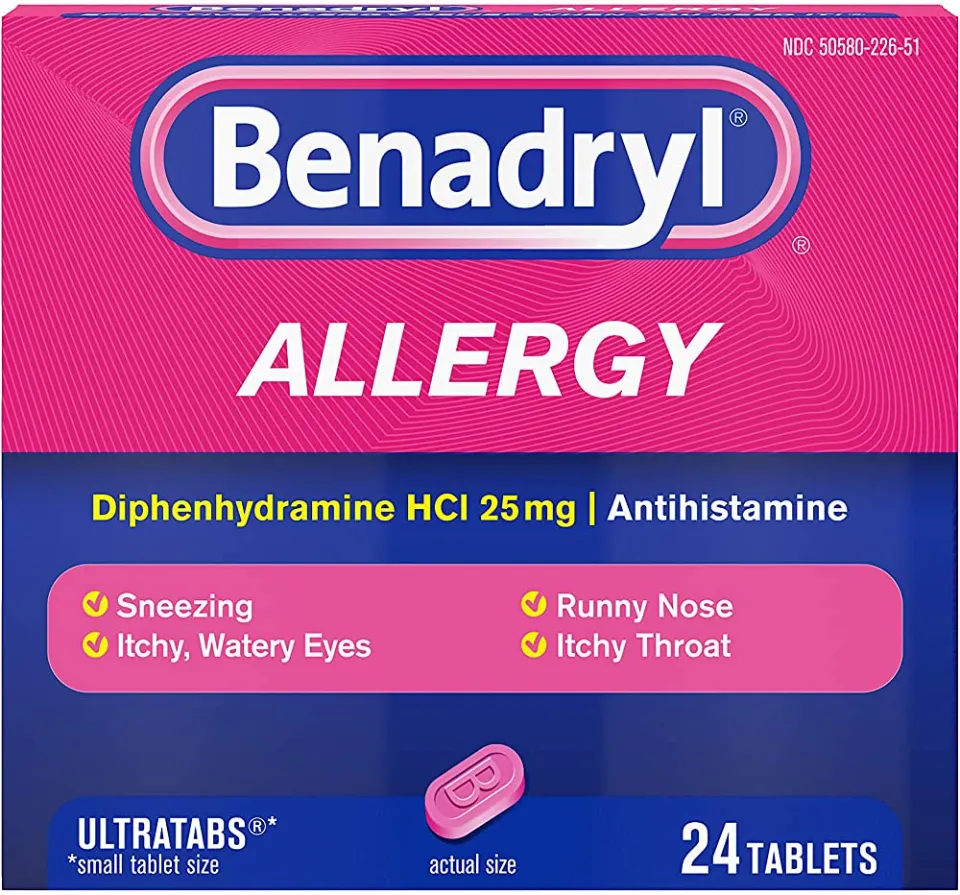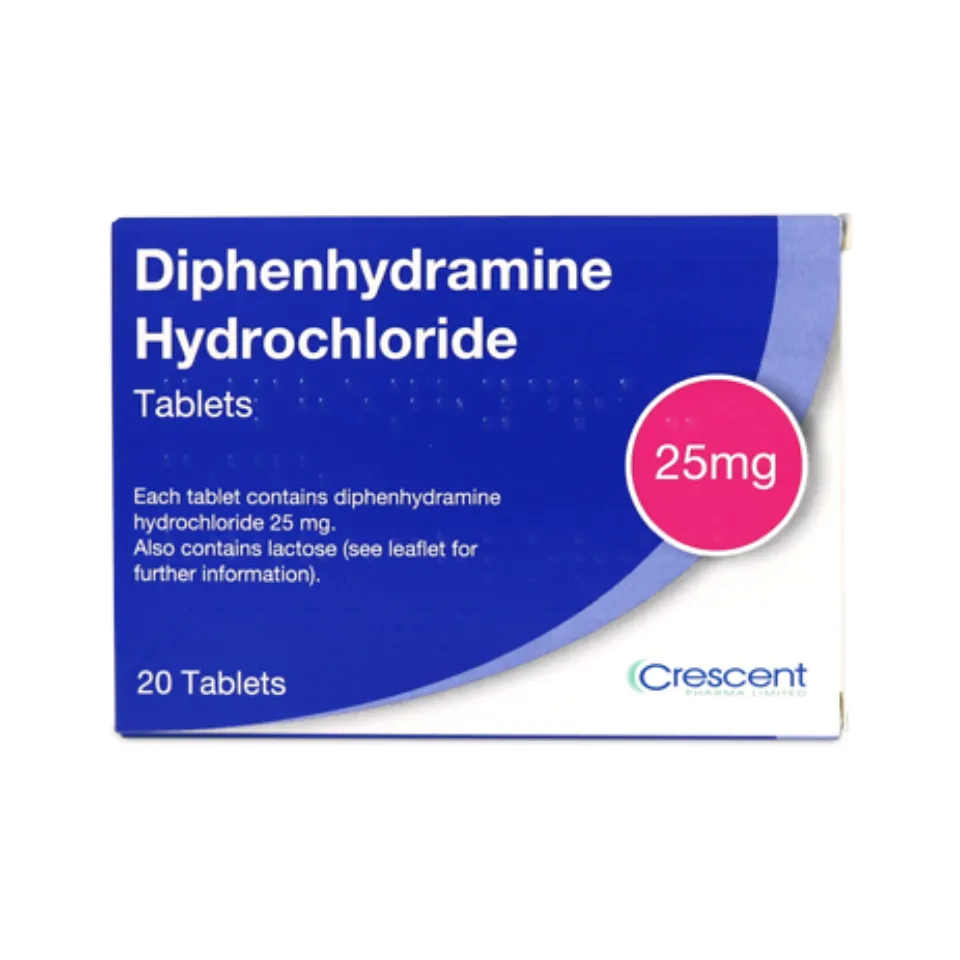It is used to treat allergies, hay fever, colds, the flu, and other allergic symptoms. Diphenhydramine (Benadryl) is a medication that belongs to the class of medications known as antihistamines.
How long Diphenhydramine remains in the body is determined by its half-life. The dosage, frequency, and even drug overdose all have an impact on the half-life of diphenhydramine. Additionally, the outcomes of a Diphenhydramine drug test are impacted by these variables.
To learn more about how long it takes for diphenhydramine to start working and to stop, continue reading.
What is Diphenhydramine (Benadryl)?
Diphenhydramine, which is marketed under the brand names Benadryl, Sominex, Unisom, among others, is most frequently used to treat allergic reaction symptoms like sneezing, runny nose, itchy eyes, scratchy throat, and breathing difficulties. Additionally offered as a sleep aid, diphenhydramine HCL benefits those who suffer from insomnia or other sleep disorders. Antihistamines like diphenhydramine work by reducing the symptoms of histamine, which is a chemical released by the immune system in an effort to protect the body from allergens like pollen, animal hair, or dust. Diphenhydramine is an antihistamine that is used to treat allergy symptoms as well as cold symptoms. One of its side effects is that it helps people fall asleep.

Diphenhydramine is available over-the-counter, but it has the potential to make users drowsy, sedated, and experience a fleeting feeling of calm. When someone takes more diphenhydramine than is advised or mixes it with another drug, they may be abusing the medication. The second situation is a typical recreational use, whereas the first one is unintentional. Drinks called “lean” and “purple drank” are substances that contain drugs like diphenhydramine as well as codeine, soda, hard candy, and alcohol. Diphenhydramine can be overdosed, so it’s crucial to use it only when necessary and as directed. The use of over-the-counter drugs frequently leads to other types of substance abuse, which necessitates the need for medical detox.
How Long Does Diphenhydramine Stay in Your System?
After 12 hours of oral administration, half of this antihistamine will be eliminated from the body. This anti-allergy medication can stay in the body for up to two days in an average healthy adult, claims a study. This drug stays in the body longer than two days in unhealthy people, especially those with liver and kidney issues.
Factors that impact how long diphenhydramine stays in your system include:
- Age: Diphenhydramine can remain in the body for a longer period of time in older adults (over 65) and younger children (under 12), as a result of slower metabolism.
- Hydration: Diphenhydramine leaves the body more quickly if you drink more water.
- Metabolism: Each person’s body processes drugs and similar substances at a different rate. The shorter the time diphenhydramine stays in your system, the faster your drug metabolism is.
- Dose taken: Even healthy adults who take more diphenhydramine than is advised may experience some unfavorable side effects. Higher than advised doses of diphenhydramine may take longer to metabolize and may result in a buildup of tolerance in the body, lengthening the time the drug will take to leave the body after use.
- Kidney health: Toxins are processed by the kidneys and expelled through the bladder. Diphenhydramine or Benadryl may be difficult for someone with kidney issues to process.
- Liver health: The duration of diphenhydramine’s stay in your system is influenced by your liver’s health, which is similar to how your kidneys are doing. Anyone with liver issues may have trouble safely using and metabolizing this medication because the active ingredient in diphenhydramine is processed by the liver.
- Presence of other medications: As was already mentioned, taking additional substances like alcohol, prescription medications, or over-the-counter medicines can alter how the body metabolizes diphenhydramine. Being cautious when using any medications is important because mixing substances in this way raises the possibility of an overdose.
- Bodyweight/mass: Drugs are processed by various body types at varying rates. People with higher body fat percentages may take longer to metabolize Diphenhydramine and other comparable drugs because drugs have a tendency to linger in fat.
Although it typically takes 500 mg of diphenhydramine to feel high or experience negative side effects, any kind of drug abuse can be harmful. Long-term use of any drug, whether OTC or prescription, carries numerous risks. It is possible to become addicted to diphenhydramine, and those who do frequently need detox and inpatient drug rehab to recover. Your risk of addiction and overdose is further increased by using OTC drugs, which often lead to other types of substance abuse.

How Long Does Diphenhydramine Stay in the Urine?
The half-life of diphenhydramine determines how long this medication remains detectable in urine. After 1 or 2 days, most of this antihistamine medication will be flushed out of the system. Even though the last dose of Diphenhydramine was taken, it would still be possible to find the drug in the urine for up to 4 days.
How Long Does Diphenhydramine Last in the Blood?
When a patient takes this antihistamine, it reaches its peak level between 2 to 4 hours in the blood. The drug’s blood level starts to fall four hours after administration. Diphenhydramine’s blood half-life is approximately 3–4 days after the final dose.
How Long Does Diphenhydramine Stay in the Saliva?
This anti-allergy medication stays in the saliva for the same length of time that it does in the blood or urine. This is approximately up to 3 to 4 days after discontinuing the drug The half-life of diphenhydramine’s elimination is used to determine this medication.
How to Flush Diphenhydramine Out of the System Safely?
Diphenhydramine detoxification is difficult, especially when a patient has used the drug for a long time or when there has been an overdose. A study found that effective detoxification gets rid of withdrawal symptoms. Here are some tips on how to flush it out from the system in a safe and effective way:
- Water: Water helps the body remove Diphenhydramine by flushing it out. Even though this is a straightforward method of flushing out the medication, it is safe and efficient to use because it also helps to alleviate allergic symptoms. Water consumption also helps the body get rid of other toxins.
- Emergency Care: A patient needs emergency care if they take too much of this anti-allergy medication. A patient will receive IV fluids, medication to counteract the drug’s effects, activated charcoal, and some laxatives during this emergency treatment.
Summary
The patient’s age and state of health have an impact on the half-life of diphenhydramine. This amount is 5.4 hours for kids. The drug’s elimination half-life is 9.2 hours in adults and 13.5 hours in the elderly. Its half-life can also be impacted by additional factors like dose.
Related Posts
- How Long Does Soma Stay in Your System? (2023)
- How Long is Flexeril in Your System? (2023)
- How Long is Sudafed in Your System? (Solved)
- How Long Do Sleeping Pills Stay in Your System?
- How Long Does Diphenhydramine Stay in Your System?
- How Long Does Eliquis Stay in Your System?
- How Long is Benadryl Good For? (Solved)










